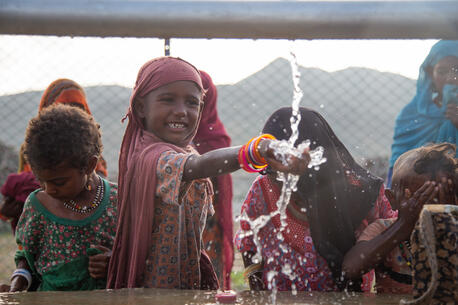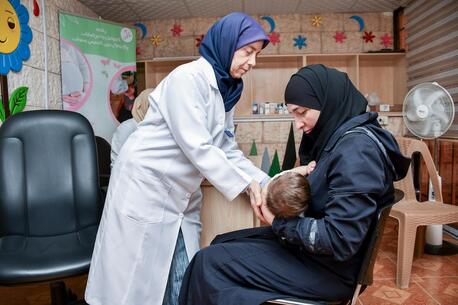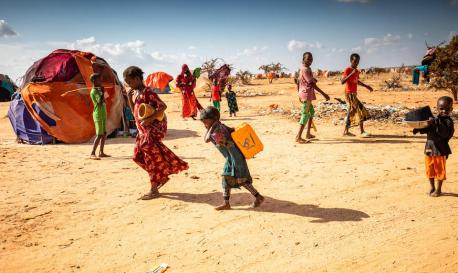
From Struggle to Sustainability in Sudan: Transforming Lives With Clean Water
How the children and women of Gelhanty, a small and remote village in Sudan's Red Sea state, gained access to a reliable safe water source, bringing joy to the community. A UNICEF partnership success story.
An end to fetching water from dirty creeks and streams
Imagine sharing a water source with animals. This was the reality for communities in the small village of Gelhanty, eastern Sudan, for many years.
Gelhanty is in Agig, one of the most remote areas of Red Sea state, where recurring drought affects water availability and the overall health and resilience of communities.
Before UNICEF helped install a solar-powered water system, the town's few available water pumps would often run dry. And like other communities in the region, residents resorted to collecting water from unsafe sources, where water was contaminated, increasing risks of disease.
Seven-year-old Madina and her family relied on a creek as their sole water source. "The water wasn't good," Madina says.

And the task was arduous. Each day, Madina and her peers would make three trips, about a mile each way, carrying a large jug and a container for scooping water. There were other dangers — gender-based violence protection risks, including sexual violence — for girls making these daily journeys.
Other children from Gelhanty, like 10-year-old Hamid, also recall how unsafe the water was. “Dogs used to drink from it, and it was dirty," Hamid says. "All the animals drank from it."
The children’s experiences speak to the burden of fetching water in water-stressed areas like Agig — a laborious and dangerous venture that also curtailed their chances of attending school.
Arafat, 10, chimes in: “We would carry heavy (16-liter) water containers across long distances on our shoulders.”

Bringing joy to children and their communities
Then in October 2023, villagers experienced transformational change. With support from the United States government through the U.S. Agency for International Development (USAID), and in collaboration with partner LM International, UNICEF constructed a solar-powered mini water yard that now provides clean and safe water to residents of Gelhanty and neighboring Tegat and Amma villages — some 1,500 people in total.
The children and women in these communities now have access to a reliable source of safe water, eliminating the need to collect water from unsafe streams.
The solar-powered water station has become a source of joy for the community, evident in the smiles of the children as they fill their containers. Women, previously burdened with carrying heavy water containers, now arrive with donkeys to collect large quantities of clean water efficiently.
Madina and her friends, enjoying the newfound convenience, take a short break to drink some water and use some to wash the sweat off their faces.
“And after this water station, we are done suffering,” Madina shares with a smile.

Arafat is just happy to have sufficient water in her home for domestic use: “We drink it, and wash utensils and clothes with it."
With the burden of fetching water lifted, Madina spends more time playing with her friends and helping her parents with domestic work. “I take advantage of the free time to read and play,” she says.
The new water system will go a long way toward improving the health of these communities — especially children, who are more susceptible to waterborne illnesses.
The water systems are also constructed closer to homes, which means they can now get water with a round trip time of at least 30 minutes, reducing the strain of collecting water, a burden often borne by girls and women.

Using solar power for sustainability
To ensure the sustainability of the water supply — and to capitalize on the fact that Sudan has an average of 10 hours of sunshine per day for most of the year — the water station is powered by solar energy, with a productivity of 5m3 (cubic meters) per hour.
Hasheem, a WASH Officer at LM International, confirms the advantages: "Using solar energy to power the system is efficient and environmentally friendly."
Operation, management and maintenance of the water station will be led by the communities themselves, to ensure sustainability and buy-in.
USAID support is also funding a related effort to improve sanitation and hygiene in the area. That initiative is taking a similar community-led approach, whereby community members conduct their own appraisal and analysis of open defecation practices and then work together to mobilize people, and identify and advance solutions.
UNICEF works in some of the world's toughest places to protect the rights and meaningfully improve the lives of children and young people with the greatest needs. Learn more about what UNICEF is doing to ensure children are healthy, educated, respected and protected. Support UNICEF. Donate today.
This story originally appeared on unicef.org
HOW TO HELP
There are many ways to make a difference
War, famine, poverty, natural disasters — threats to the world's children keep coming. But UNICEF won't stop working to keep children healthy and safe.
UNICEF works in over 190 countries and territories — more places than any other children's organization. UNICEF has the world's largest humanitarian warehouse and, when disaster strikes, can get supplies almost anywhere within 72 hours. Constantly innovating, always advocating for a better world for children, UNICEF works to ensure that every child can grow up healthy, educated, protected and respected.
Would you like to help give all children the opportunity to reach their full potential? There are many ways to get involved.




